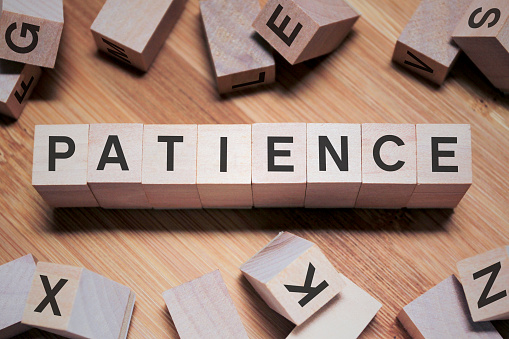As living beings, we are prone to lose our patience at one point but doing so frequently and not being able to properly manage our emotions tends to affect our mental health in the long run. Patience is often said to be a virtue and every individual needs to be able to cultivate this skill in their lifestyle to maintain their sanity.
As long as we continue to breathe and socialize with others, our patience level would often be put to test which could be at home, at school, workplace, at grocery stores, events/functions, hospitals, and even among our peers.
Patience can be said to refer to the following:
• Endurance – the ability to withstand challenges without losing control.
• Tolerance – the ability to tolerate the excesses of others, unpleasant or stressful situations for a prolonged time.
• Ability to control one’s anger or temper.
• Ability to wait things out without being upset.
• Ability to stay calm without getting frustrated.

According to Sarah Schnitker, there are three types of patience: daily hassle patience, life hardship patience, and interpersonal patience.
Daily hassle patience refers to patience needed in unavoidable circumstances or beyond one’s control when carrying out daily activities e.g. being stuck in a traffic jam, a long queue at the bank or ATM, or when your car suddenly develops a fault. According to Schnitker, people with this type of patience are usually less depressed and more satisfied with life.
Life hardship patience refers to the ability to face challenges without getting into despair or frustration. For instance, a cancer patient hoping for their treatment to work, a woman yearning for the fruit of the womb, an innocent prisoner wishing to be acquitted, an unemployed person persistently and consistently filling job application forms, etc. this type of patience comes from a place of hopefulness.
Interpersonal patience refers to the patience needed in dealing with people without getting annoyed, frustrated, or angry. A study by Schnitker shows that those who are patient towards others tend to be more hopeful and satisfied with their lives.
Methods of practising patience
There are different methods of practising patience:
1. Be mentally prepared before you set out.
2. Take a deep breath.
3. Learn to stay calm in any situation: Staying calm enables us to handle the situation better before it escalates and gets out of control and even if the other party is being impatient, at a point, they will also calm down if they do not get the same energy back.
4. Work on your emotions: This might be a little difficult but practice improves your handle on your emotions. If you do this frequently, you get better at handling and controlling your emotions.
Benefits of practising patience
• The act of practising patience allows individuals to bear frustrations and difficulties.
• It also assists individuals in coping with upsetting and stressful situations.
• It helps us to make smart and rational decisions.
• It helps us to be able to put our emotions in check.
• Patience allows us to be more empathetic, and forgiving and helps us to build strong and lasting relationships with others.
• Being patient gives us the energy to be tolerant of others.
• It helps in reducing conflict before it escalates.

Being impatient can bring about negative emotion, emotional distress, increased heartbeat (which can lead to high blood pressure), and verbal abuse among others. It is therefore advisable that we all should imbibe this skill into our daily routine because of its benefits.


